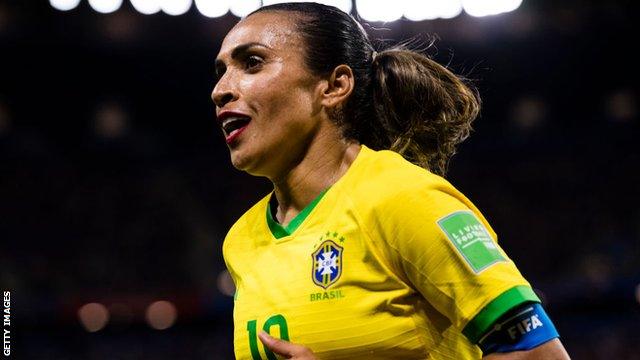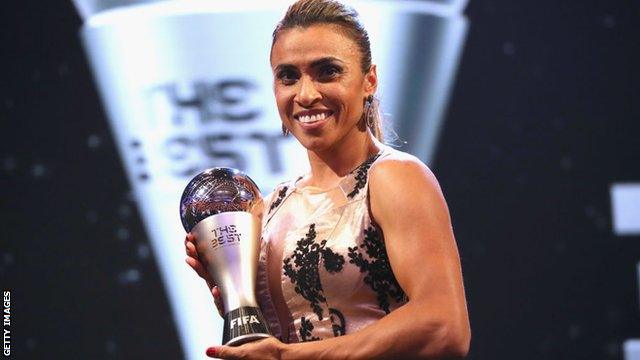England Women v Brazil Women: Why Marta is still the one to watch
- Published

Marta was honoured in 2007 by becoming the first woman to have the imprint of her feet recorded in cement at the famous Maracana stadium
England v Brazil |
|---|
Venue: Riverside Stadium, Middlesbrough Date: 5 October, 12:45 BST |
Coverage: Live on BBC One and online, live text commentary and match report on the BBC Sport app. |
When Brazil travel to Middlesbrough to take on England on Saturday, there is one player everyone will have their sights set on - Marta.
The Brazilian legend is the all-time top scorer for her country, has been a flag bearer at a home Olympics, received a phone call from legendary striker Pele when she was a teenager and is largely considered the greatest player of her generation.
But what makes her so special?
Record-breaking goals
Marta's unbelievable goal from the 2007 Women's World Cup
Marta's seven goals in China in 2007 led Brazil to their first Women's World Cup final.
At this year's tournament in France, the 33-year-old became the first player to score at five World Cups with a penalty against Australia.
Then less than a week later, her goal in a 1-0 win over Italy made her the all-time leading goal scorer in World Cup history with 17, moving ahead of Germany men's striker Miroslav Klose (16).
With 112 goals in 147 appearances, Marta has a better minutes-per-goal ratio than any other Brazilian - and she has netted more than a quarter of her side's World Cup goals.
The world's best on six occasions

Marta has been named the Best Fifa Women's Footballer a record six times
Between 2006 and 2010, Marta won five successive Fifa World Player of the Year awards and remains the only female footballer to have won more than three times.
She added a sixth award in 2018 when she beat German midfielder Dzsenifer Marozsan and Ballon d'Or winner Ada Hegerberg.
Marta has placed inside the top three a further seven times and made the Best XI in 2016, 2017 and 2019 - only France's Wendie Renard has been included on more occasions.
She has also won a number of top scorer accolades playing for clubs in Sweden and America, plus the Golden Ball award for the best player at the 2004 Under-19 World Cup, then both the Golden Ball and the Golden Boot at the senior World Cup in 2007.
American magazine Sports Illustrated named Marta in the top 20 female athletes of the decade between 2000 and 2009.
Inspiring the next generation
As well as her achievements on the pitch, Marta has inspired a new generation and has fought for equality in women's football.
Following Brazil's last-16 exit in France, Marta gave an emotional speech calling on young players to follow in her generation's footsteps.
"Women's football depends on you to survive," she said. "Think about it, value it more. We're asking for support, you have to cry at the beginning and smile at the end.
"It's about wanting more, it's about training more, it's about looking after yourself more, it's about being ready to play 90 minutes and then 30 minutes more."
Marta said she hoped her achievements would "push for women's empowerment".
"Let me be clear, this is not only in sport. This is a struggle for equality across the board," she added.
England forward Beth Mead, who will face Marta in Saturday's match at the Riverside, described Marta as a "legend" and said she is "a player that we respect on and off the pitch".
"Marta is someone that I have watched for many years growing up," Mead told BBC Sport. "The things she has done in the women's game are phenomenal."
The World Cup win is still missing
Like Lionel Messi with Argentina, Marta's individual brilliance has not been enough to lead Brazil to World Cup glory.
A second-place finish in 2007 was the closest she came, while Olympic gold medals have slipped through her grasp on two occasions.
When you talk of Brazilian footballers, you think of three-time world champion Pele, and iconic striker Ronaldo who picked up the Golden Ball at the 1998 World Cup and the Golden Shoe in 2002.
Marta has certainly done her bit individually but aside from 2007, Brazil Women have failed to go beyond the World Cup quarter-finals and exited at the last-16 in the two most recent tournaments.
Marta scores penalty to become all-time World Cup top scorer
Will she get another chance?
Marta, at 33, is running out of time to win a World Cup, but it's not out of the question.
Brazilian team-mate Formiga, 41, became the oldest player in the tournament's history when she competed this summer, making four appearances including the last-16 defeat by France.
Elsewhere, American Kristine Lilly - the most capped (352) footballer in history - retired at 39, while Canadian Christine Sinclair, 36, captained her country for the fourth time at a World Cup this summer.
Two-time World Player of the Year Carli Lloyd, 37, also appeared in every game for the USA in France, while the oldest player to feature in a final is American defender Christie Pearce (formerly Rampone) who picked up a winner's medal in 2015 at the age of 40.
BBC Sport has launched #ChangeTheGame to showcase female athletes in a way they never have been before. Through more live women's sport available to watch across the BBC in 2019, complemented by our journalism, we are aiming to turn up the volume on women's sport and alter perceptions. Find out more here.